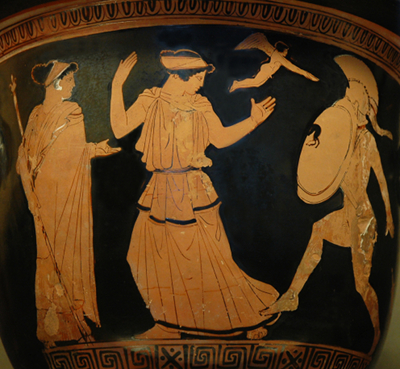Who Am I?
“The face that launched one thousand ships”
Helen was the daughter of Leda, queen of Sparta, and Zeus. She was sister to Pollux and half-sister to Castor and Clytemnestra.
When Helen was still very young, Theseus, king of Athens, and Pirithous, king of Larissa, kidnapped her because they wanted, before they died, to make love to a daughter of Zeus. Theseus, however, soon left Helen in the care of his mother while he went with Pirithous to capture Persephone.
 dWhile Theseus was gone, Helen’s brother and half-brother, Pollux and Castor, rescued her.
dWhile Theseus was gone, Helen’s brother and half-brother, Pollux and Castor, rescued her.
Once Helen was returned to Sparta, she attracted an impressive array of suitors – including Odysseus, Diomedes, Protesilaus, Patroclus, and Ajax.
Odysseus made the suitors swear to an oath, stating that each suitor must defend the honor of whomever was chosen as Helen’s future husband. King Tyndareus, Helen’s step-father, soon chose Menelaus, son of Atreus to be her husband.
By Menelaus, Helen bore Hermione, Aethiolas, Maraphius, and Pleisthenes.
Paris, the young Trojan prince, was the judge for the beauty contest between three goddesses. He chose Aphrodite as the most beautiful and as a prize he was promised Helen, the most beautiful woman in the world. Paris sailed to Sparta, and Menelaus treated him as a royal guest. Immediately after Menelaus left to Crete for a funeral, Paris and Helen took off, with a large amount of Menelaus’ wealth, for Troy.
According to some, Helen had fallen in love with Paris of her own accord. Other stories blame Aphrodite for Helen’s infatuation.
Whatever the case was, Menelaus was outraged and took the suitors up on their oath.
The Trojans, seeing the beauty of Helen, were awed and a marriage between Paris and Helen was soon prepared.
Odysseus and Menelaus were sent to Troy to beseech Helen’s return. Priam, however, refused. The Greek forces then began armament. The abduction of Helen became a matter of national honor.
The stories that peope have written of Helen during the 10 years of war do not paint a flattering portrait. Some people say that Odysseus, disguised as a beggar, infiltrated the Trojan walls. Once inside, Helen learned of his identity but did not turn him in, and instead helped him steal the Palladium. Some stories say that she knew that the Greeks were inside of the Trojan horse, and she circled the horse, calling out to each of the Greek men in the voice of their wife in the hopes of luring them out.
When Paris was dying, his brothers Deiphobus and Helenus argued over who would get Helen. Paris chose Deiphobus and claims later that she was forced to marry him. When Troy fell, Odysseus and Menelaus found Helen with Deiphobus. Menelaus killed Deiphobus (perhaps aided by Helen herself). Although Menelaus had intended to kill his unfaithful wife, her charms captivated him once again and he put her on his ship, announcing that he would kill her later. After seven years of travel on the sea, Helen and Menelaus reached Sparta and Menelaus had all but forgotten Helen’s betrayal.
Some say that Helen lived out the rest of her life in Sparta. Others say that she was exiled by her bastard stepsons. Others say that she was captured by Orestes and Pylades, who meant to kill her, but at the last moment she disappeared into the sky, where she became the guardian of sailors. Some even say that after her death, Helen went to the White Isle to marry Achilles.
Helen has a conflicting image in Greek mythology. That is, some describe her as being the innocent wife, cruelly abducted. Others call her fickle, and blame the Trojan War on her adultery.
It is the story of the Trojan War that dominates over Helen’s personality. That is, her fate and plight are told and retold, while her feelings and personality are more ambiguous. So, while Helen is a main character in the Trojan War, her character – in and of itself – is very weak. Her character, in fact, is defined by the Trojan War – and her place in it.
Glossary of Terms:
Page 54: “on Ida‘s top”
Ida is another name for Mt. Olympus, which is the mythic resting place of the Greek Gods – a mountain so high, it reaches the heavens.
Page 54: “The virgin Pallas”
Pallas is the Roman name for Athena, the goddess of the hunt, who never married or lay with a man.
Page 54: “While Juno promised”
Juno is the Roman name for Hera, the wife of Zeus.
Page 54: “But Venus brib’d him”
Venus is the Roman name for Aphrodite, goddess of love and beauty.
Page 55: “thy sails for Crete”
Crete is a large island that rests to the south of Greece in the Mediterranean Sea; between the regions of Anatolia (modern day Turkey) and Greece, though in Ancient Greece, it was under Grecian rule.
